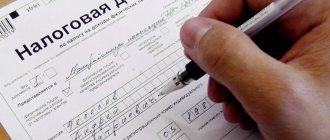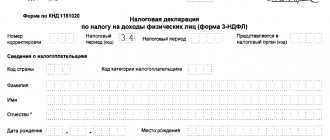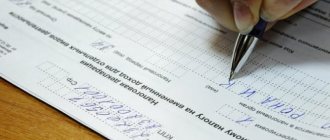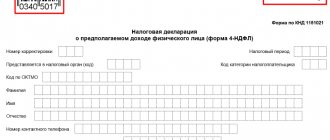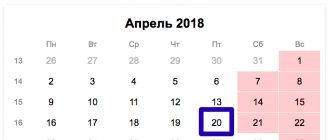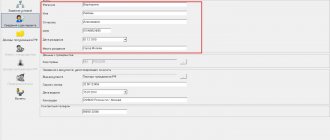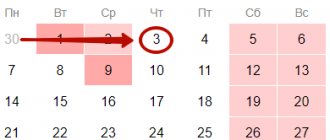Let us assume that some time after submitting the Tax Return for Personal Tax in Form 3-NFDL, it will be discovered (by the taxpayer himself or the Federal Tax Service Inspectorate) that errors were made when drawing up the declaration. Or not all data was fully reflected in the declaration, which resulted in the payment of personal income tax (NDFL) in a smaller amount than required.
In this case, the taxpayer has the obligation to submit an updated tax return in Form 3-NDFL. This approach is enshrined in Article 81 of the Tax Code of the Russian Federation.
Errors may also be found in the declaration that did not result in underpayment of personal income tax. In this case, the updated declaration may not be submitted, since in this case the submission of an updated declaration to the Internal Revenue Service is the right, and not the obligation, of the taxpayer (
How to fill out an updated 3-NDFL declaration: step-by-step instructions
Before moving on to questions about how to correctly submit a 3-NDFL adjustment, you need to understand the terminology and legal norms. Articles 80 and 81 of the Tax Code of Russia apply on the topic of the declaration and its clarification. Based on these articles, an amended, or corrective, declaration is a report filed after errors, incomplete information, or missing information are discovered in the original declaration. Moreover, from the point of view of the Tax Code of the Russian Federation, such errors and information are divided into 2 types:
In the first case, an obligation is established, since this is in the interests of the state budget. In the second case - the right, since these are the interests of the citizen, for example, he made a mistake in indicating the amount to be returned or wrote down a personal income tax amount that was larger than necessary, etc. The second situation also includes technical errors - for example, an incorrect OKTMO in the declaration or inspection code, etc.
Let's look at step-by-step instructions on how to fill out the corrective 3-NDFL declaration for property deduction. What you need to know:
- you must use the version of the form that was valid in the year for which you are updating the data;
- the report is submitted at the place of permanent residence;
- You can submit a paper or electronic form;
- The declaration must be accompanied by a covering letter with explanations and documents justifying the corrections.
There is a new form for 2021 - you can download it here . And here is a version of the program for filling out a report on a computer. You can find the 2021 and 2016 versions on this page .
Example 1
Igor Nikolaev submitted Form 3-NDFL in January of this year to continue receiving a property deduction for the purchase of a house. He has already received 1,300,000 rubles in previous years and wants to receive the rest. His salary for 2021 was 500,000 rubles. After submitting the declaration, he remembered that he had medical expenses in the amount of 100,000 rubles, and now he wants to get a deduction for them.
To correct the report, Nikolaev needs to fill out a new one.
Important! You can change data for the last 3 years, even if you have already received a deduction for this period. By submitting an adjustment, you change the BCC and the refund amount is counted against the changed expenses.
For example, in 2021 you received a deduction for an apartment and in 2019 you submitted an adjustment to receive a refund for treatment. The deduction you receive will be counted toward treatment expenses, and the property deduction will be transferred to the next year. Whereas the opposite cannot be done - only the property deduction can be transferred from year to year, the rest are either used within the allowable period or written off.
What Nikolaev’s first declaration looked like:
- Title page - adjustment “0”, since this is the first report, of course, there are no changes in it.
- Section 1. Here you can see that the essence of the declaration is a refund of the tax paid.
- Section 2. From this sheet you can see how the refund amount came about.
- Appendix 1. Key sheet - you can see how much the applicant paid to the budget, 65,000 is the maximum that Nikolaev can return for 2021, and the method of return - in the form of a social, property or other deduction - changes, because you can submit two declarations 3 -Personal income tax for one year, and even after receiving the money you can change the method.
- Appendix 7. This shows the portion used, the current deduction and the balance for the next year.
Sample of filling out the corrective declaration 3-NDFL:
- Nikolaev had treatment expenses of 100,000, for which he can return 13,000 rubles. And he paid 65,000 to the budget, which means he still has the tax paid to be refunded through the property deduction, therefore, sheets are added to the form - Appendix 7 and Appendix 6.
- In Appendix 7, the filling is similar to the first declaration, except for a few important lines.
- So, in line 140, 400,000 is written instead of 500,000, since the base decreased by 100,000, which was pulled over by the social deduction.
- The new amount of the available base is duplicated in line 150 - the same 400,000.
- Accordingly, the balance also changes - 300,000 instead of 200,000, it is written in line 170.
- Appendix 5 is added.
- Here in column 140 you need to indicate your expenses for treatment - 100,000.
- The same amount is repeated in columns 180, 190 and 200.
- Nothing changes in Appendix 1.
- In Section 2 the calculation remains the same.
- Section 1 retains the same result, since the sum has not changed, only the places of the syllables have changed.
- There is one change on the title page—adjustment “1” is added.
The 3-NDFL update is submitted with all documents that confirm the changes. In this case, you need to attach receipts for treatment expenses, an agreement with a medical institution, a copy of the license, and a certificate of receipt of medical services. It is advisable to attach a cover letter so that the inspection inspectors can quickly carry out desk control of your documents.
Sample cover letter:
You can download it from here .
If you have questions or need help, please call Free Federal Legal Advice.
Who must file a declaration
There are a number of citizens who are required to pay taxes on their profits at a rate of 13 percent.
These taxable incomes include:
- Renting an apartment to an individual.
- Salary (you don’t have to submit a declaration yourself - this will be done by the accounting department).
- Sale of movable and immovable property owned for less than three years, according to the latest changes, even 5) years.
- A one-time cash receipt within the framework of a civil contract, for example, from services or contract work.
- Winning in a lottery, casino or other gambling game.
- Income received outside the Russian Federation.
Individual entrepreneurs are also subject to this taxation; legal organizations, such as notaries or lawyers who receive income from their activities, are no exception. In addition, this list can include tutors in various subjects.
Exemption from filing a declaration occurs in the following of the listed cases:
- Having a permanent place of work. This is interesting! When a citizen of the Russian Federation is officially employed, the 3-NDFL declaration is filled out for him by the accounting department at the place of employment. Accordingly, if you need to receive this declaration in person, you will have to contact the chief accountant for a copy. But the accounting department prepares a declaration only for the payment of income tax on wages. If a citizen receives any additional profit, then the filling will have to be done independently or with the help of a specialist for additional dividends.
- Lack of permanent work, including due to child care. There is no need to file a declaration in this situation, since the person does not receive any profit. The need to file may arise only if the citizen receives additional income.
Each individual registered for work in accordance with the Labor Code of the Russian Federation automatically pays personal income tax on their salary accruals, which is subsequently transferred to the regional budget. Each organization, regardless of its form of ownership, acts as a tax agent.
There are situations when an employer, for some reason, does not pay tax for its employees. This information is reflected in the 2-NDFL certificate, which each employee can obtain from the organization’s accounting department. In this case, an employee employed in accordance with the Labor Code of the Russian Federation is required to independently submit a 3-NDFL declaration.
This is interesting! A declaration in form 3-NDFL can also be submitted in order to obtain a tax deduction, for example, when purchasing a home for the first time or when receiving paid education. A tax deduction by law is a reduction in the tax base.
In case of territorial change of residence, registration with another tax authority is carried out within five days after submitting all necessary documents.
How to make an adjustment to the 3-NDFL declaration in your “Personal Account”?
If you filled out the 3-NDFL declaration online incorrectly, you can submit an adjustment in the same way - in your “Personal Account” or on a paper form. The form and method of presentation do not affect the result - they are identical.
If the updated report turns out to have errors, when submitting a new one, you not only correct the contradictions and errors, but also thus cancel the correcting 3-NDFL declarations - all that were submitted previously for the same period. But
Example 2
Nikolaev Igor filed a declaration for 2021 in connection with the sale of real estate, which he owned for less than 3 years. The proceeds from the transaction are 3,000,000 rubles. He took advantage of a property deduction in the amount of 1,000,000 rubles. But then he decided to present expenses - 2,000,000 rubles.
To correct an error in the 3-NDFL declaration online, follow the instructions:
- Log in to your “Personal Account”.
- Open the “Life Situations” tab.
- Go to the page to submit the report.
- Here you can fill it out online or download the form filled out in the program.
- If you fill out online, you need to go through 7 steps.
- At the first stage, you need to make changes - when asked about the order of submission, you must answer “No”.
- A line will appear to indicate the adjustment number. Put “1” if this is your first updated form for this period.
- Select income.
- Deductions - if you have them.
- Add income - source first.
- Select a source attribute. If your buyer is an ordinary citizen, then he is an individual.
- Enter the buyer's name.
- Then the income itself is exactly as in the first report.
- Revenue has code 1510.
- This is where the main adjustment is made - changing the deduction. Instead of a deduction under Article 220, a deduction in the form of expenses is chosen.
- Enter your expenses.
- Check the results and click on the “Next” button.
- If you have no deductions, skip step 5.
- Check out the results.
- The resulting report can be seen in form form. It will be distinguished by a different adjustment number - “1”.
- Using an electronic signature, you can immediately send the report to the Federal Tax Service.
Be sure to attach documents before sending, otherwise the inspection will not confirm your right to a deduction.
How to adjust the form
In your Personal Account on the official website of the Federal Tax Service, you can correct your declaration. But it also happens that errors are also made in the clarification. Then the corrections are made again. The new updated declaration will cancel the previous ones.
The adjustments have their own numbers. They are necessary in order to clarify which declaration a citizen submits for the same tax period. In order to enter the correction number, there is a special cell.
The first copy of the declaration is the number zero in the specified window, the second is 1, the third is 2, and so on. The new declaration forms for adjustments give three boxes at once, the number is put in one of them, and the rest must be filled in with zeros.
Adjustment codes are necessary for the Federal Tax Service inspector to more easily understand the taxpayer’s intentions. There are cases when a citizen is forced to prepare several declarations if he needs to receive more than one deduction.
The cell for the correction number is located immediately on the first sheet.
Deadline for filing and verification of the corrective declaration 3-NDFL
Conventionally, the following deadlines can be identified for submitting an updated report:
- before the deadline for filing - in the case of 3-NDFL this is the first working day of May;
- before the deadline for tax payment - income tax is paid until July 15 inclusive;
- until the inspection detects errors and incomplete information;
- before the on-site tax audit.
If the adjustment concerns a statement in which there is no amount payable because of deductions, then the adjustment is possible all year round, just like filing the original form. Urgency applies only to cases where there is an amount to be paid to the budget.
The first term is the only one in which you do not fall under Article 119 of the Tax Code of the Russian Federation. In all other cases, you commit a tax offense - untimely submission of reports, however, according to Article 81 of the Tax Code of the Russian Federation, there are circumstances that exempt you from sanctions even in this case.
Adjusting the 3-NDFL declaration takes the same amount of time as a regular report - 3 months. On the day your adjustment is received, the inspecting inspector stops the desk audit of the old report and begins a new one - based on the updated declaration.
Inclusion of maternity capital and budget funds in expenses
The inclusion of maternity capital in expenses is considered a significant violation. Young people under the age of 30 make similar mistakes. Using capital when buying an apartment (or when paying interest), they do not hesitate to include it in their expenses, but this is wrong. Maternity capital is not the applicant’s personal income, but is provided to him by the state. The person does not earn this money and does not inherit it. Consequently, these funds cannot be considered income in the literal sense of the word, therefore, including maternity capital in expenses to obtain deductions is a gross violation of the rules for filling out 3-NDFL.
By the way, educational expenses paid from maternity capital are also not taken into account when determining the tax deduction. An attempt to take these amounts into account in 3-NDFL to obtain tax preferences is also considered a violation.
The exact same rule applies to other amounts received from the budgets of the Russian Federation and its constituent entities. Thus, applicants do not have the right to include in expenses funds received under the “Providing Housing for Young Families” program, as well as various types of subsidies to government employees and the military for the purchase of apartments.
Sanctions for errors in 3-NDFL
Important! If you submitted an adjustment before the end of the period established for submitting the report, the action is considered timely, you do not fall under Article 119 of the Tax Code of the Russian Federation and the sanctions arising from it.
If the deadline has passed, then the following options are possible:
- the report was submitted before the end of the period approved for payment of personal income tax on it and before the citizen learned that the Federal Tax Service Inspectorate had identified a lack of information or its incomplete reflection, as well as errors in the declaration leading to a reduction in the amount of tax, or the Federal Tax Service Inspectorate had ordered an on-site inspection;
- the report was submitted after the end of this period, but the citizen did this before the inspection identified errors and scheduled an on-site inspection and paid the missing part of the tax and penalty before filing;
- the report was submitted after the end of the personal income tax payment period, but after an on-site inspection, the Federal Tax Service did not reveal any errors or contradictions.
In the absence of such circumstances, Article 119 of the Tax Code of the Russian Federation - late declaration, and Article 122 of the Tax Code of the Russian Federation - incomplete payment of tax may be applied to you.
An attempt to obtain deductions for transactions with related parties
Many Russians buy housing from their relatives: brothers, sisters, fathers, mothers or children. Some of these transactions are made simply for show, but there are also real contracts. However, the law categorically prohibits the provision of property deductions for transactions concluded between interdependent persons (relatives). Accordingly, the cost of paying interest on loans received from related parties for the purchase of housing cannot be included in the declaration. It is also worth noting that, along with relatives, the Tax Code of the Russian Federation classifies the applicant’s employers as interdependent persons, as well as companies that he owns (or in which he has a share).
Results
- If the 3-NDFL declaration is submitted with errors or incomplete information or its absence , then you can submit an updated report with explanations and new documents.
- The adjustment declaration must have the same form as the original one, and differ in content only in those parts that have been changed.
- For mistakes, you may be subject to tax sanctions , but in the cases specified in Article 81 of the Tax Code of the Russian Federation, the citizen is exempt from liability.
- After adjusting 3-NDFL, you need to wait another 3 months for the completion of a new desk audit.
Trying to recoup costs for part-time or evening studies
Also a widespread mistake. It is mainly found in regions and rural areas. People are trying to get a deduction for the education of their children (as well as a brother or sister) through correspondence or evening classes. However, in order to receive benefits, it is necessary that children (or wards) study only full-time. According to legislators, correspondence (evening) education implies that the student can work part-time or do business, and therefore the state does not provide tax preferences in this case.
